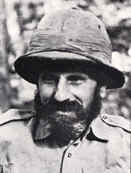Orde Wingate was a British general in World War Two who helped to revolutionise the way war could be fought in the jungle. Orde Wingate was by any standards unconventional but his impact in the war in the Far East should not be underestimated – neither should the part played by his Chindits.
 |
Wingate was born in 1903 in India. He received a conventional education (Charterhouse and Woolwich) and in 1922, Wingate gained a commission in the Royal Artillery.
Between 1922 and 1927, Wingate served in the Sudan and later in Palestine.
In 1940-41, he led a guerrilla force which operated on the Ethiopian-Sudanese border. The so-called ‘Gideon’s Force’ was very successful against the Italian Army that was there. However, the whole concept of a commando unit was new and any army is likely to have been nonplussed on how to cope with such a force.
Wingate suffered from a physical and nervous breakdown during this time in his life. Regardless of this, Wingate and his unit had impressed a number of senior officers in the British Army.
In May 1942, Wingate was sent to Burma where he formed ‘Wingate’s Raiders’ – though they are better known as the Chindits, named after the Burmese word ‘chinthe’ meaning lions; after the lion statues that guarded the temples in Burma. General Wavell, Commander-In-Chief, India, already knew about Wingate as he had come near to court-martialing him for insubordination when General-Officer Commanding the Middle East. Wingate arrived as a major but was quickly promoted to colonel.
This group was to cause chaos to the Japanese behind their lines. They used classic hit-and-run tactics against the Japanese who up to 1942, had only really experienced military success. Now they had to fight an enemy they could not see. The Chindits were especially successful along the Irrawaddy River where they caused a great deal of damage to Japanese supply lines. The Chindits also sent information back to the Royal Air Force to assist their operations. This unit did a great deal to weaken the Japanese force that was in Burma and its work continued even after Orde Wingate was killed in a plane crash in April 1944.
|
“Wingate saw himself as a boot up the backside of Man. The fact that most of his ideas ran directly against those of his superiors did not worry him in the slightest.” (Arthur Swinson) |
| “Today we stand on the threshold of battle. The time of preparation is over, and we are moving on the enemy to prove ourselves and our methods. We need not as we go forward into the conflict, suspect ourselves of selfish or interested motives. We have all had the opportunity of withdrawing and are here because we have chosen to be here…..we have chosen to bear the burden and heat of the day. Our aim is to make a government of the world in which all men can live at peace with equal opportunity of service. Finally, knowing the vanity of Man’s efforts and the confusion of his purpose, let us pray that God may accept our services and direct our endeavours, so that when we shall have done all we shall see the fruit of our labours and be satisfied.”
Message from Wingate to the men on the first ever mission by the Chindits. |
![]()